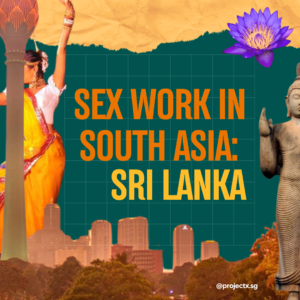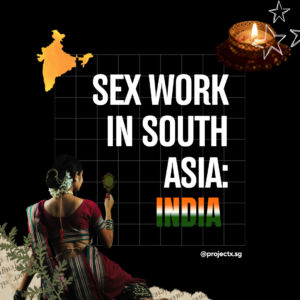Preface
This is the second post in Project X’s new series, Sex Work in South Asia – a series designed to encourage greater understanding of and dispel misconceptions about sex work in the South Asian region. This series will consider the state of the sex industry and sex workers rights in each of the following South Asian countries: India, Bangladesh, Sri Lanka, and Nepal. This post focuses on Bangladesh. It will elaborate on the historical context and economic impact of sex work, sex worker statistics, sex work in Bangladesh’s cultural context, and finally, the future of the sex industry in Bangladesh.
Brief History
Law, Policy, Policing
Sex work in Bangladesh is quasi-legal. In order to obtain a license to do sex work, a woman has to swear an affidavit to state that she is over 18 years old and is doing it of her own volition. Once licensed, she can start working in a brothel. There are a total of 20 registered brothels like Daulatdia and Kandapara, whereas the other unlicensed brothels are deemed illegal under the Constitution. As of 2023, UNAIDS estimates that there are 161,800 sex workers in Bangladesh’s sex trade. Under the licence, the affidavits protect the brothel managers and sex workers from the police and judiciary. However, The Prevention and Suppression of Human Trafficking Act, 2012 (PSHTA) prohibits public solicitation and the running of a brothel, which renders both pimps and street-based sex work illegal.
While the licence can provide some form of legal protection over sex workers and their brothel managers, they are still at risk of unlawful brothel evictions. In 2014, Kandapara, a licensed brothel that is at least 200 years old was evicted on threats by the Anti-Social Activities Resistance Committee (AARC). According to legal rights experts, the eviction is a blatant attempt by local ruling Awami League Party leaders to grab land while capitalising on the taboo of prostitution in Bangladesh. Those who were evicted consisted of 927 registered sex workers, a few hundred seasonal workers and their family members. When sex workers went to the local authorities, at least 50 of them were arrested and sent to safe homes. Contradictorily, local authorities had assured the media that the land where the brothel stood was legally owned by sex workers. The Sex Worker Network of Bangladesh (SWNOB) have stated that politicians have control over brothels where they can demand and threaten sex workers using violence. Bangladesh has a history of unlawful brothel evictions despite the landmark ruling that such evictions were illegal in 2000. In 1997, 600 sex workers were evicted from Kandupatti, one of the country’s oldest and registered brothels. Another illegal eviction occurred against Fultola, a brothel in Khulna. The brothel had been evicted unlawfully several times, with the last eviction in 2015. Most of the sex workers who were evicted were licensed, contravening the legal rights accorded to them.
Despite the legality of their work for licensed sex workers, mainstream services like the local authorities and the police have failed to uphold their legal rights. Sex workers are viewed either as criminals or victims when they consult the authorities. It’s also worth noting that sex workers face obstacles with the law when it comes to reporting cases of sexual assault. Section 155(4) of the Evidence Act, which was only repealed in 2021, suggests that a rape victim can be proved as a woman of general immoral character before the court with a view to shaking her credibility. This Act does not only affect the general population of women, but also disproportionately affects female sex workers to a heightened degree.
Other forms of sex work that are not brothel-based, which includes street-based and hotel-based workers, are also subjected to vagrancy and public solicitation laws. Many sex workers have reported that they have been arrested under Section 290 of the Penal Code for being ‘obscene’ or a ‘public nuisance’ even though the police cannot arrest any person for an offence under Section 290 of the Penal Code without the permission of a magistrate. Section 54 of the Criminal Procedure Code 1898 empowers police to arrest without warrant under “reasonable suspicion”. Further, the Constitution explicitly states in Article 18 that the State shall adopt effective measures to “prevent prostitution and gambling”. The criminalisation of sex workers in Bangladesh and misappropriation of laws all together perpetuates precarious situations. Sex workers and their children are denied their basic labour, social and legal rights due to the ambiguity over the legitimacy of sex work in Bangladesh.
Sex Worker Statistics and their Economic Impact
From 2015-2023, the number of sex workers in Bangladesh, has increased from 140,000 to 161,800 sex workers, with less than 4,000 being brothel-based workers. The remaining numbers constitute street-based, hotel-based and residential-based sex workers. There is a network of 14 quasi-legal brothels operating and 18 officially recognised red-light districts across Bangladesh. Registered sex workers usually work in one of the 14 quasi-legal brothels. The largest is Daulatdia which houses about 1,900 sex workers, making it one of the largest brothel complexes in the world. According to the 2005 Bangladesh Institute of Development Studies (BIDS) data, brothel-based sex workers earned 7,355 takas (SGD$ 89.26) per month, while independent sex workers earned 8,776 takas (SGD $106.51) per month. This income from sex work compares favorably with what females earn in the rest of the labour market for nonsex work in Bangladesh.
Sultana and Scott highlight that sex workers in Bangladesh usually fall under one of two categories: bonded or independent sex workers. Most sex workers’ trajectories begin under bondage, where their madams often force bonded sex workers to work in exploitative conditions (H. Sultana & J. Scott, pp. 614-616). Independent sex workers rent rooms at the site and run their own business. They can exercise greater autonomy over their working conditions and are not indebted to anyone. It is also important to note that, despite the dominant narrative that brothel-based sex workers are forced or trafficked into sex work, sex workers have varied, ambivalent experiences which fixed models of agency or victimhood fail to account for (H. Sultana & J. Scott, p. 62).
Culture, Religion, and Social Norms
Notions of honour and shame, and sexual purity contribute to the reasons as to why sex work is politically and socially stigmatised. Such notions of purity are tightly linked to female sexuality in Bengali society. Thus, adjectives such as fallen (potita), bad (kharap), spoilt (nosto), slut (beshya), and marketplace women (bajarer-meye) are used to refer to sex workers’ “fallen” status in Bangladesh (Chowdhury, 2006, p. 343). Even the Department of Social Services disparages sex work as a profession, and by extension sex workers, and believes that it is a sinful and inhuman activity that is polluting society (Department of Social Services 2017, paras 1-3 as cited in Sultana, 2020). Such moralistic undercurrents are also shared by neo-abolitionist Bangladeshi feminist movements. During the sex workers rally for sex workers’ rights in Bangladesh, Shanu, a sex worker who attended the rally, added that the media expose them and their families to the general public, not considering the repercussions such disclosures might have on their social standing (NSWP, 2017), exacerbating the fear and violence sex workers face and the stigma towards sex workers. According to a CEDAW Report for Bangladesh sex workers, the social “image” and reputation of their family members are tarnished when sex workers are photographed and exposed.
Being a Muslim-majority nation-state, Islam serves as the cornerstone of Bangladesh’s gender ideology and cultural mores. When sex workers pass away, their bodies are often dumped into the river or unmarked graves and not accorded dignity through the proper Islamic funeral rituals. Unprecedentedly, in 2020, a former sex worker, Hamida Begum, in Daulatdia brothel was given a formal Islamic funeral (BBC News, 2020). This was only achieved after a coalition of sex workers persuaded local police authorities to convince religious leaders to carry out the formal burial. It is further important to note that despite being a Muslim country, sex work was already legal in the country during its colonial period. Brothels that are quasi-legal are mostly legacy brothels, which have existed since ancient times.
The topic of sex itself and non-normative female sexuality, however, remains “immoral” and a taboo, which makes it hard for a healthy, public discussion about sex work to exist, by extension. Despite this, it is encouraging to see a robust sex worker movement in Bangladesh that managed to make positive changes towards sex worker representation and identity politics. In order to challenge such state violence and social views that perpetuate harm, sex workers in Bangladesh organised across different parts of the country to seek justice and their fundamental human rights.
“Potita” (fallen one) as a term for sex worker was largely dropped from official and popular discourse, with female sex workers being labelled as “jounakormi” (sex workers) instead (Huq, 2006). This marks a significant step towards overcoming the stigma and social discrimination that sex workers often encounter.
The Hope for Law Reform
Sex work in Bangladesh is viewed as a corollary of poverty which engenders the standard welfare response of rehabilitating sex workers into marriages and “respectable” occupations. Ulka, a sex worker led organisation, questioned such prescriptions and instead advances for social acceptance and recognition of sex work as legitimate labour (Tasneem et al., 2020). On top of that, sex worker activism also began to protest against the illegal evictions of brothels, brothel workers, and the violence they faced. Through this movement, it transformed a sex worker’s identity from “fallen woman” to “regular worker” (Sultana, 2015).
On 3 March 2017, over 95 sex workers, some accompanied by their children, held a rally seeking justice and access to their fundamental rights on International Sex Worker Rights Day in Shahbagh, Bangladesh. Mitu, a sex worker who attended the rally, explained that currently:
“We don’t receive any recognition as legitimate workers so we’re deprived of our rights” (NSWP, 2017).
One of HARC’s top priorities now is to prevent the violations of sex workers’ human rights such as the arrest of sex workers by police and brothel evictions/closures (HARC, 2016). Niger Sultana of HARC emphasises that one of their biggest challenges is that their organisation as a whole and their network of sex workers need to address the stigma around sex work and the discrimination coupled with the profession. She hopes that their advocacy work would change the mindsets of the general public, elevating the status of sex work a bit. However, she acknowledges that this would be a tedious process that would require many stakeholders’ concerted involvement. (ibid.)
References:
1. CARE Bangladesh. (2014). Review of Existing Laws and Policies Relating to Sex Workers In Bangladesh. Retrieved December 4, 2023, from https://www.carebangladesh.org/publication/Publication_5820760.pdf
2. Chowdhury, Reshmi. 2006. “‘Outsiders’ and Identity Reconstruction in the Sex Workers Movement in Bangladesh.” Sociological Spectrum 26 (3) pp. 335-357
3. Department of Social Services. 2017. “Shamajik Protibondhi Meyeder Proshikhkhon O Punorbashon Kendro [Rehabilitation and Training Center of the Socially Handicapped Women].” Accessed March 20, 2017. http://dss.gov.bd/site/page/72bb38e9-ce97-4471-8e14-e2e7ef43fa89/
4. Global Network of Sex Work Projects. (n.d.). Infosheet on Sex Work in Bangladesh. Retrieved December 4, 2023, from https://www.nswp.org/country/bangladesh
5. HIV/AIDS Research and Welfare Centre (HARC), Bangladesh. (2016). HARC Information Sheet. Retrieved December 7, 2023, from https://www.nswp.org/featured/hivaids-research-and-welfare-centre-harc-bangladesh
6. HRW, “Ravaging the Vulnerable: Abuses Against Persons at High Risk of HIV Infection in Bangladesh” (HRW) <www.hrw.org/reports/2003/bangladesh0803/> accessed 5 December 2023
7. H. Sultana & J. Scott (2022) The Organisation of Sex Work in Bangladesh, South Asia: Journal of South Asian Studies, 45:4, 605-620, DOI: 10.1080/00856401.2022.2069786
8. Huq, S. (2006), Sex Workers’ Struggles in Bangladesh: Learning for the Women’s Movement. IDS Bulletin, 37: 134-137. https://doi.org/10.1111/j.1759-5436.2006.tb00315.x
9. Islam, Asadul, and Russell Smyth, ‘Economics of Sex Work in Bangladesh’, in Scott Cunningham, and Manisha Shah (eds), The Oxford Handbook of the Economics of Prostitution, Oxford Handbooks (2016; online edn, Oxford Academic, 5 Dec. 2016), https://doi.org/10.1093/oxfordhb/9780199915248.013.8 , accessed 5 Dec. 2023
10. Jenkins, Carol and Habibur Rahman. 2002. ‘‘Rapidly Changing Conditions in the Brothels of Bangladesh: Impact on HIV=STD.’’ AIDS Education and Prevention 14:97–102.
11. Karin Heissler, ‘Background paper on Good Practices and Priorities to Combat Sexual Abuse and Exploitation of Children in Bangladesh’ (UNICEF, 2001) accessed 30 November 2023); Ann D. Jordan, ‘Commercial Sex Workers in Asia: A Blind Spot in Human Rights Law’ in Kelly D. Askin and Dorean M. Koenig (eds.), Women and International Human Rights Law (2nd Vol, Transnational Pub Inc 2000) pp. 525-585
12. Khan, Zerina Rahman and Helaluddin Khan Arefeen. 1989. Potita Nari: A Study of Prostitution in Bangladesh. Dhaka: CSS; Khan, Zerina Rahman and Helaluddin Khan Arefeen. 1990.The Situation of Child Prostitution in Bangladesh. Dhaka: CSS. Klandermans, Bert. 1992. ‘‘The Social Construction of Protest and Multiorganizational Fields.’’ Pp. 77–103 in Frontiers in Social Movement Theory, edited by A. D. Morris and C. M. Mueller. New Haven CT and London: Tale University Press.
13. Landmark Islamic funeral held for sex worker in Bangladesh. (2020, February 12). BBC News. Retrieved December 7, 2023, from https://www.bbc.com/news/world-asia-51472606
14. Mondal, A. H., and A. Islam. 2006. Policy Research on the Crucial Issues of the SociallyDisadvantaged Women (Commercial Sex Workers) and Their Children in Bangladesh.Dhaka: Bangladesh Institute of Development Studies
15. NSWP. (2020, April). COVID-19 Impact – Bangladesh. Retrieved December 5, 2023, from https://www.nswp.org/news/covid-19-impact-bangladesh
16. Sultana. (2017, June). SEX AS “WORK”: THE BANGLADESHI CONTEXT. New Zealand Journal of Asian Studies , 19(1), 93–110
17. NSWP. (2017, March 8). 95 Street-Based Sex Workers Rally for Sex Workers’ Rights in Bangladesh. Retrieved December 5, 2023, from https://www.nswp.org/news/95-street-based-sex-workers-rally-sex-workers-rights-bangladesh
18. Sex Workers Network (SWN), Bangladesh & Sex Workers and Allies in South Asia (SWASA), Bangladesh Chapter. (2016, October). Submission On The Status of Sex Workers in Bangladesh to the United Nations Committee on the Elimination of Discrimination Against Women. Retrieved November 30, 2023, from https://www.nswp.org/sites/default/files/cedaw_report_bangladesh_swasa_-_2016.pdf
19. Shukla. (2010, April). Sex Work and Laws in South Asia: Monograph. Retrieved December 4, 2023, from https://www.sangram.org/sangram-resources/research-monograph-20
20. Shireen Huq, ‘Sex Workers’ Struggles in Bangladesh: Learning for the Women’s Movement’, IDS Bulletin 37, no. 5 (2006): 135–36.
21. Sultana, H. (2020, December 29). Towards a Southern Approach to Sex Work. https://doi.org/10.4324/9780429342707
22. Sultana. N. (2021). Sex Workers Speak Out. Retrieved December 5, 2023, from https://www.nswp.org/sex-workers-speak-out
23. Sultana H. (2015). Sex worker activism, feminist discourse and HIV in Bangladesh. Culture, health & sexuality, 17(6), 777–788. https://doi.org/10.1080/13691058.2014.990516
24. Tasneem, Mrittika, Zilur, & Zillur. (2020, April 5). The Women’s Movement in Bangladesh Throughout the Years. The Daily Star. Retrieved December 7, 2023, from https://www.thedailystar.net/in-focus/news/the-womens-movement-bangladesh-throughout-the-years-1889908
25. UNAIDS, United Nations Population Fund (UNFPA), & United Nations Development Programme (UNDP). (2015, December 5). Sex Work and the Law in Asia and the Pacific. Retrieved December 5, 2023, from https://www.undp.org/publications/sex-work-and-law-asia-and-pacific
26. UNAIDS, ‘Sex workers: Population size estimate – Number, 2016’ (UNAIDS, 2016) accessed 5 December 2023






